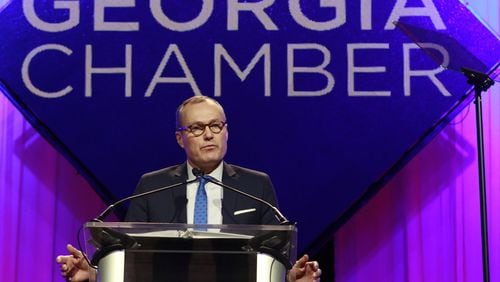The annual breakfast featuring business executives and the state’s most influential elected leaders had all the makings for an awkward spectacle, but instead it turned into a chance for Georgia’s political establishment to declare a clean slate after months of strained relations.
The confab was organized by the Georgia Chamber and sponsored by corporate powers who were almost universally opposed to a major “religious liberty” measure from the past legislative session — and it featured two legislative leaders who orchestrated its passage last year.
But any hint of discord was papered over on Tuesday as all sides declared a truce and vowed to focus on other challenges. It was another sign that the state’s GOP establishment, if not some of its rank-and-file activists, is looking to put the contentious debate behind it.
"As we enter a new legislative session, you're not going to hear me talk a lot about the past," House Speaker David Ralston said. "This is a call to action for Georgia's future."
He and Lt. Gov. Casey Cagle repeatedly said during the run-up to the legislative session that started Monday that they wanted federal lawmakers — and not state ones — to tackle the debate that’s divided the Legislature for three years.
It was a sharp contrast from their stances less than a year ago, when both backed House Bill 757, which would have allowed faith-based organizations to deny services to those who violate their “sincerely held religious beliefs.”
Gov. Nathan Deal's veto of the measure in April set the stage for another fight this year, and state Sen. Josh McKoon said he's working with other Republicans to soon present another version of the bill. And similar proposals are making the rounds, including one involving adoption rights.
McKoon, a Columbus Republican and possible contender for higher office, said Georgia leaders are turning their backs on religious conservatives to focus on renewing a hospital fee and debating whether to allow casinos.
“This debate will not end because GOP leaders close their eyes and wish it away,” he said. “What is needed now is strong leadership on this and other conservative priorities — not excuses while a GOP-controlled Legislature seriously considers more taxes and legalizing gambling.”
Moving on?
The legislation has morphed over time, but supporters typically want Georgia to join the 21 other states that have similar laws they say will protect people of faith from government intrusion, as well as strengthen legal protections for opponents of gay marriage.
McKoon and others point to instances where Christian college students were ordered to cancel public displays of faith and a Muslim student at Georgia State University who was asked to remove her veil by a professor as examples of its necessity.
The opponents, including powerful business boosters and gay rights groups, warn the measure amounts to legalized discrimination and point to executives from dozens of big-name companies, including Apple, Disney and Time Warner, who called on the governor to veto the bill.
And they’ve been quick to point to Indiana and North Carolina as cautionary tales. Indiana still faces a business backlash after passing similar legislation in 2015, while North Carolina has been at the center of a raging national debate after adopting a much broader measure involving transgenders using bathrooms.
Deal has tried to shut the door on HB 757’s revival, saying that he hasn’t budged from the objections he laid out last year, when he declared the legislation didn’t reflect Georgia’s welcoming image as a state full of “warm, friendly and loving people.”
“Let us continue to walk this road of success that we have traveled together,” he told business leaders Tuesday, urging them to stay the course. “If we do, I can assure you that my report to you next year will be even more pleasing.”
Cagle made no mention of the legislation in his remarks, instead delivering what many in the room saw as a preview of a likely gubernatorial campaign. His focus, he said, will be on making sure Georgians “have access to the most dynamic public education in the nation.”
Earlier, Cagle told reporters that Republican Donald Trump’s presidential victory sapped the need for a new “religious liberty” protection because he’s set to appoint conservative jurists to the U.S. Supreme Court.
“Much of the fears that existed prior to that may have subsided,” he said.
‘Looking at other things’
But some of the harshest words came from Ralston, who said after his remarks that he has no appetite to revive the debate this year.
“We’ve spent a lot of energy and time on that issue over the last three years. We passed a measure last year and the governor, in his authority, vetoed it,” Ralston said. “I respect his decision, and now I’m looking at other things. And I don’t plan to spend a lot of time on that.”
The proposal remains popular in grass-roots Republican circles, and activists in most of Georgia’s 14 congressional districts approved resolutions supporting the legislation and panning Deal’s veto.
An Atlanta Journal-Constitution poll released last week showed Georgia voters remain more torn, with a plurality — 44 percent — saying lawmakers should drop the issue while 40 percent back a renewed effort. The poll had a margin of error of plus or minus 4 percentage points.
But without support from any of the big three — Deal, Cagle and Ralston — the chances of a revival are significantly dimmer.
Business leaders, meanwhile, said they were ready to stick a fork in the issue.
“We had that debate last year, and the governor took a courageous stand and vetoed that,” said Chris Clark, the Georgia Chamber’s chief executive. “Members of the General Assembly are smart. They’re ready to move on.”
Legislative session coverage
To see more of The Atlanta Journal-Constitution's coverage from the Georgia General Assembly's legislative session, go to http://www.myajc.com/georgia-legislature/. To track particular bills and resolutions, check out the Georgia Legislative Navigator at http://legislativenavigator.myajc.com/. You can also follow the proceedings on Twitter at http://twitter.com/GAPoliticsNews or on Facebook at http://facebook.com/gapoliticsnewsnow.
About the Author








